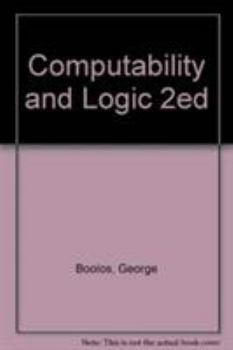Computability and Logic 2ed
Select Format
Select Condition 
Book Overview
Computability and Logic has become a classic because of its accessibility to students without a mathematical background and because it covers not simply the staple topics of an intermediate logic... This description may be from another edition of this product.
Format:Paperback
Language:English
ISBN:0521299675
ISBN13:9780521299671
Release Date:February 1981
Publisher:Cambridge University Press
Length:304 Pages
Weight:1.00 lbs.
Customer Reviews
5 ratings
Worked for class
Published by Thriftbooks.com User , 14 years ago
My professor uses this book to the last word. It's a good book overall however the content is not exactly easy. I would recommend this for someone who has a little knowledge of the subject. A novice could possibly use it with the help of google.
Very good textbook
Published by Thriftbooks.com User , 15 years ago
I grew up with earlier editions of this book and now teach from it. It's an excellent introduction to this material, pitched at just the right level, in my experience, for its intended audience. For students (or people in general) who are extremely sophisticated mathematically, it can sometimes seem a little unrigorous. But for my students, who are mostly philosophers, it manages to convey a sense for what is going on without overdoing it on the detail. This is not to say that it does not get rigorous where necessary. It does. But when that's not critical, it's content to leave things at a more intuitive level. As far as approach is concerned, the book places recursion theory at the center. The first several chapters introduce the basics of this subject, and only then do the authors turn toward theories of arithmetic and the like. This corresponds to what is probably the dominant way of thinking of Goedel's theorem: that, at its core, it is a theorem in recursion theory. Other topics are covered along the way, too, of course, and there are several different courses one could teach using this book. The selection of problems is good, too.
Very lucid explanations
Published by Thriftbooks.com User , 22 years ago
This book is regarded as a 'classic' and rightly so. It assumes a minimal background, some familiarity with the propositional calculus. Even this can be dispensed with, if the reader is sufficiently motivated, as there is a well-written review of the first-order logic that one typically learns in an introductory formal logic course.The book is highly readable. Each chapter begins with a short paragraph outlining the topics in the chapter, how they relate to each other, and how they connect with the topics in later and earlier chapters. These intros by themselves are valuable. The explanations though are what stand out. The authors are somehow able to take the reader's hand and guide him/her leisurely along with plentiful examples, but without getting bogged down in excessive prose. And they are somehow able to cover a substantive amount of material in a short space without seeming rushed or making the text too dense. It's nothing short of miraculous.What made the book especially appealing to me is that it starts right out with Turing Machines. As a topologist who recently got interested in computational topology, I needed a book that would quickly impart a good, intuitive grasp of the basic notions of computability. I have more "mathematical maturity" than is needed to read an introductory book on computability, so I feel confident in saying that most of the standard texts on computability revel in excessive detail, like defining Turing Machines as a 6-tuple -- something that serves no purpose other than pedantry. This book is different. I particularly liked how the authors stress the intuitive notions underlying the definitions. For example, they lay special emphasis on the Church-Turing thesis, always asking the reader to consider how arguments can be simplified if it were true.One should note that the emphasis of this book is more towards logic. While it starts with issues of computability, it moves into issues of provability, consistency, etc. The book covers the standards such as Goedel's famous incompleteness theorems in addition to some less standard topics at the end of the book. A small set of instructive exercises follows each chapter.
Bigger than it looks!
Published by Thriftbooks.com User , 24 years ago
This book may be inappropriate for those without logic background or those with just a passing interest in computability. It is dense and 'avalanches' quickly to very advanced topics. For the serious student, however, this book is, IMHO, wonderful. It is readable, complete, and the advancement from one topic to the next is appropriate if the student takes her time.I also found the "level of difficulty curve" in the exercises worked well. That is, both beginning and advanced students should be challenged.
Rigorous but readable
Published by Thriftbooks.com User , 27 years ago
Just about the only mathematical logic book readable by ordinary human beings, assuming only a background of first-order predicate logic, taught in almost any introductory logic class. The first eight chapters introduce Turing machines and other formal models of computation, emphazing the evidence for Church's thesis. Chapters 9-13 prove important results concerning first-order logic, including soundness, completeness, compactness, and Lowenheim-Skolem. The rest of the book focuses on number theory, and proves results such as Goedel's incompleteness theorems, Loeb's theorem, the existence and structure of non-standard models of arithmetic, and the decidability of Presburger arithmetic. Highly recommended as an introduction to mathematical logic.






